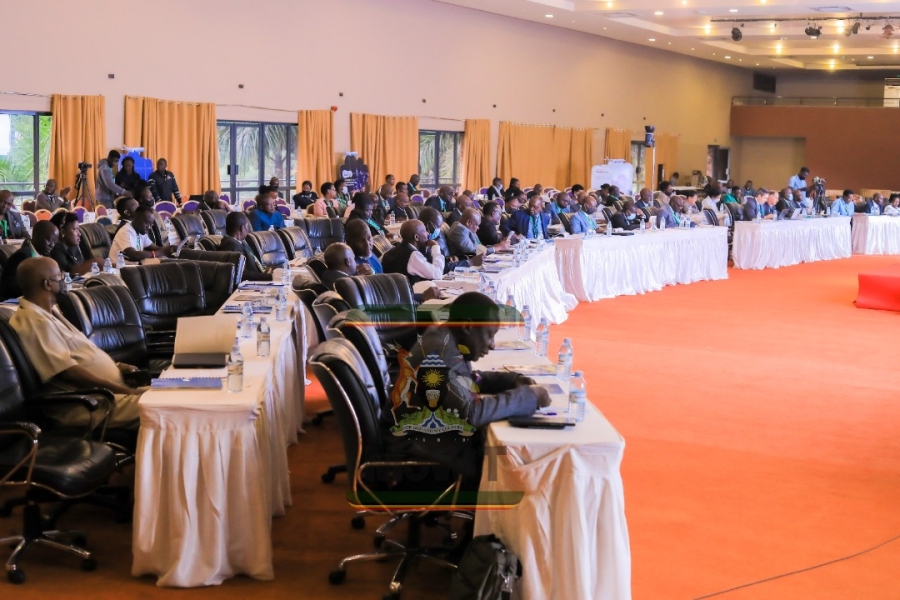The Ministry of Works and Transport held its second Integrated Transport Infrastructure and Services Programme Review workshop on the 8th of December, 2022. The performance review ran under the theme “Optimizing Transport Infrastructure and Services for Socio-economic Development”.
The review workshop evaluated the annual Programme performance for the Financial Year 2021/22 in terms of investments, achievement of outcomes and interventions, opportunities, and challenges. It is based on Programme Indicators and interventions as outlined in NDP III and Programme Implementation Action Plan (PIAP).
Under the ITIS Programme, the key Programme stakeholders include up to 33 implementing partners with MoWT, UNRA, UCAA, URC, URF, KCCA, and UNACL as the lead implementing partners and the Ministry of Works and Transport as the leader of the Programme. These are the MDAs whose performance was reviewed at the workshop and recommendations accorded.
The second Annual ITIS Programme Review Workshop was officially opened by the Rt. Hon. Prime Minister and attended by the Sector Ministers, Hon Members of Parliament, Development Partners, and Representatives from MDAs, LGs, Private Sector, CSOs and the Media.
While officiating at the Workshop, the RT. Honourable Prime Minister, Robinah Nabanja pointed to the Government’s recognition of the notable steady progress registered under the ITIS Programme.
“The improvement in the stock and quality of productive infrastructure has greatly improved connectivity, enhanced competitiveness of our products, widened the Country’s export base and created more wealth,” said the Prime Minister.
“The role of transport in realizing our agenda on mineral-led industrialization, economic infrastructure, oil and gas as well as science, technology and innovation to drive job and wealth-creation to secure the lives of Ugandans, is undoubtedly important,” she added.
The NDP III rightfully identifies Uganda’s transport infrastructure as an integral part of its regional and international competitiveness. This is mainly because productivity in virtually every sector of the economy is affected by the quality and performance of the country’s transportation and other types of infrastructure. Therefore, access to and efficiency of transport infrastructure is critical to Uganda’s competitiveness and ability to harness its regional and globalization potential.
The goal of the ITIS Programme is to develop a seamless, safe, inclusive and sustainable multi-modal transport system and all the Programme interventions are aligned to this development goal and that of the Country.
The Minister for Works and Transport, Gen. Katumba Wamala while speaking about the general performance of the programme pointed out in FY 2021/22, Parliament appropriated a total budget of UGX 4,966.60 Bn to the ITIS Programme with GoU and Development Partners contributing 59.02% and 40.98% respectively. Up- to 86% of the approved budget was released and this was directed to a portfolio of up-to 64 projects and various recurrent programme activities.
Consensus by the participants at the workshop was that by prioritizing Uganda’s transport objectives the Country will be able to realize a well-connected transport network that is key in providing inclusive economic benefits that result in multiplier effects such as industrialization, increased access to markets, employment and attracting private sector investment.
It was recommended that the Programme prioritizes the rehabilitation of roads which have been damaged as an effect of the heavy rains. It was also decided that it is imperative that there is increased funding for road maintenance.
Vehicle testing commencement to ensure that vehicles that do not meet the required standards in terms of emissions’ are not allowed on the roads was also a strong recommendation.
With an advent into the aviation industry, it was recommended that the East African Civil Aviation Academy should be strengthened to be in position to train the human resource necessary for the lucrative aviation industry.
Overall, the Programme performance during FY 2021/22 was to a great extent satisfactory despite some challenges.

